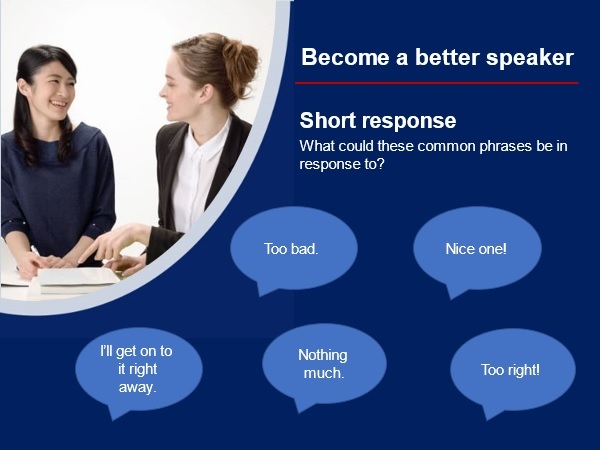自然なイギリス英語を話そう!①
英語を話す日本人の生徒さんから、もっと長い文章を話せるようになって、英会話のスキルを向上させたい!という声をよく聞きます。スピーキングを上達させるにはこのようなアプローチはとても有効ですが、時に会話では短い簡潔な答えの方がより効果的・自然なこともあるのです。
日本人の生徒さんたちは、キャッチボールのようなやりとりをする英会話が難しい、とよく言います。テニスの試合で素早く、スムーズに、また効果的にサーブを返すように、英語で応答をしたい。英語には、このようなゴールを達成することができる、短い定型の表現が多数あります。是非ここで紹介する短い返答を覚えて、日常生活で活用してみてください。結果として、どんな質問やコメントに答えるときも、あなたの英語はとても自然に聞こえるようになります。
今回はいくつかのよく使われる短い定型表現をみてみましょう。

このような表現はご存知ですか?
I’ll get on to it right away
Nice one!
Nothing much
Too bad
Too right!
では、下記のような場面では上記のどの表現を使って返答ができるでしょう?
- I missed my train by a matter of seconds.
- It’s not much but I won £25 in the national lottery last week.
- Nurses and other frontline healthcare staff deserve better pay.
- This customer request has just come in and although we have a waiting list, this one must be prioritised.
- What did you do during the summer holidays?
- A: I missed my train by a matter of seconds. (数秒ってところで電車を逃しちゃったよ。)
B: Too bad. Hope it didn’t affect your plans too much.
(それは残念だったね、予定があまり狂わなかったといいんだけど)
Too bad – is similar to that’s a shame – used to express sympathy for other people’s minor moments of inconvenience or disappointment
- A: It’s not much but I won £25 in the national lottery last week.
(大した事ないけど、先週宝くじで25ポンド当たったんだ)
B: Nice one! Next time, let’s hope it’s the jackpot! (よかったね!今度はジャックポットだといいね!)
Nice one! – is used to show happiness for someone else’s good news. Usually a small piece of good news.
- A: Nurses and other frontline healthcare staff deserve better pay. (看護婦さんや最前線で働く医療従事者たちはもっといい給料をもらって当たり前だよね。)
B: Too right! They are the unsung heroes. (全くその通りだよ。彼らは影の英雄だね。)
Too right! – is used to show agreement that what was said was undoubtedly true, often with implied negative consequences for it not happening.
- A. This customer request has just come in and although we have a waiting list, this one must be prioritised. (お客様からのリクエストが入ってきました。ウェイティングリストがあるけれど、この件は優先してください。)
B. I’ll get on to it right away. I’ll try to finish by tomorrow. (すぐに取り掛かります。明日には終わらせるように します。)
I’ll get on to it right away – an idiom meaning to start an activity without delaying any more. There is a sense of urgency to start.
- A. What did you do during the summer holidays? (夏休みは何したの?)
B. Nothing much. We didn’t go away this year. (大した事してないよ。今年はどこも行かなかった。)
Nothing much – used to express the lack of anything special or interesting to report on.
PS Englishでは、ロンドン・イギリスだけでなく、オンラインで世界中に拠点を置く日本人の皆様を対象に、英会話教育を行っています。より自然な英語を話せるように、ネイティブスピーカーの講師がマンツーマンでレッスンを行います。イギリス英語を学びたい!という方は是非こちらから無料コンサルテーションをお申込みください。
一般英語だけでなく、ビジネス英語、IELTS対策、お子様向けレッスンも可能です。

